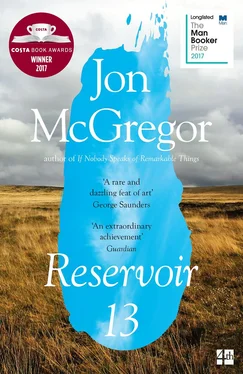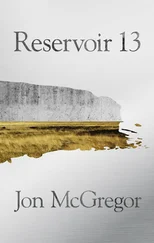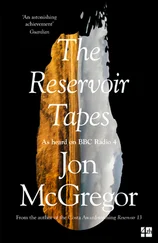At midnight when the year turned there were fireworks going up from the towns beyond the valley but they were too far off for the sound to carry and no one came out to watch. The dance at the village hall was cancelled, and although the Gladstone was full there was no mood for celebration. Tony closed the bar at half past the hour and everyone made their way home. Only the police stayed out in the streets, gathered around their vans or heading back into the hills. In the morning the rain started up once again. Water coursed from the swollen peat beds quickly through the cloughs and down the stepped paths which fell from the edge of the moor. The river thickened with silt from the hills and plumed across the weirs. On the moor there were flags marking where the parents said they’d walked. The flags furled and snapped in the wind. At the visitor centre television trucks filled the car park and journalists started to gather. In the village hall the trestle tables were laid with green cups and saucers, the urns rising to the boil and the smell of bacon cobs drifting out into the rain. At the Hunter place there were voices coming from the barn conversion where the parents were staying, loud enough that the policeman outside could hear. Jess Hunter came over from the main house with a mug of tea. A helicopter flew in from the reservoirs, banking slowly along the river and passing over the weir and the quarry and the woods. The divers were going through the river again. A group of journalists waited for the shot, standing behind a cordon by the packhorse bridge, cameras aimed at the empty stretch of water, the breath clouding over their heads. In the lower field two of Jackson’s boys were kneeling beside a fallen ewe. There was a racket of camera shutters as the first diver appeared, the wetsuited head sleek and slow through the water. A second diver came round the bend, and a third. They took turns ducking through the arch in the bridge and then they were out of sight. The camera crews jerked their cameras from the tripods and began folding everything away. One of the Jackson boys bucked a quad bike across the field and told the journalists to move. The river ran empty and quick. The cement works was shut down to allow for a search. In a week the first snowdrops emerged along the verges past the cricket ground, while it seemed winter yet had a way to go. At the school in the staffroom the teachers kept their coats on and waited. Everything that might be said seemed like the wrong thing to say. The heating pipes made a rattling noise that most of them were used to and the mood in the room unstiffened. Miss Dale asked Ms French if her mother was any better, and Ms French outlined the ways in which she was not. There was a silence again in the room and the tapping of the radiator. Mrs Simpson came in and thanked them for the early start. They all said of course it wasn’t a problem. Under the circumstances. Mrs Simpson said the plan was to follow their lessons as normal but be ready to talk about the situation if the children asked. Which it seemed likely they would. There was a knock at the door and Jones the caretaker stepped in to say the heating would be working soon. Mrs Simpson asked him to make sure the yard was gritted. He gave her a look which suggested there’d been no need to ask. When the children were brought to school Mrs Simpson stood at the gate to welcome them. The parents lingered once the children had gone inside, watching the doors being locked. Some of them looked as though they could stand there all day. At the bus stop the older children waited for the bus to the secondary school in town. They were teenagers now. It was the first day back but they weren’t saying much. It was cold and they had hoods pulled tightly over their heads. All day they would be asked about the missing girl, as if they knew anything more than they’d heard on the news. Lynsey Smith said it was a safe bet Ms Bowman would ask if they needed to chat. She did finger-quotes around the word chat . Deepak said at least it would be a way of getting out of French. Sophie looked away, and saw Andrew waiting at the other bus stop with Irene, his mother. He was the same age as they were but he went to a special school. Their bus pulled up and James warned Liam not to make up any bullshit about Becky Shaw. It snowed and the snow settled thickly. There was a service at the church. The vicar asked the police to keep the media away. Anyone was welcome to attend, she said, but she wanted no photography or recording, no waving of notebooks. She wanted no spectacle made of a community caught in the agony of prayer. The wardens put out extra chairs, but people were still left standing along the aisles. The men who weren’t used to being in church stood with their hats bent into their hands, leaning against the ends of the pews. Some folded their arms, expectantly. The regulars offered them service books opened to the correct page. The vicar, Jane Hughes, said she hoped no one had come looking for answers. She said she hoped no one was asking for comfort. There is no comfort in the situation we find ourselves in today, she said. There is no comfort for the girl’s parents, or for the family members who have travelled to the village to support them. No comfort for the police officers who have been involved in the search. We can only trust that we might meet God among us in these times of trouble. Only ask that we not allow ourselves to be overcome by a grief which is not ours to indulge but instead be uplifted by faith and enabled to help that suffering family in whatever way we are called to do. She paused, and closed her eyes. She held out her hands in a gesture she hoped might resemble prayer. The men who had their arms folded kept them folded. The warden rang the bell three times and the sound carried out through the brightening morning and along the valley as far as the old quarry. At the end of the month the sun came out and the fields softened. The still air shook to the thump of melting rooftop snow. There were rumours and only rumours of where the parents might be now. They were beside themselves, it was said.
In February the police arranged a reconstruction, bringing actors over from Manchester. There had been no leads and they wanted to make a fresh appeal. The press were allowed up to the Hunter place and given instructions on what to film. The day was clear and edged with frost. The press officer asked for quiet. The door of the barn conversion opened and a couple in their early forties appeared, followed by a thirteen-year-old girl. The woman was slim, with blonde hair cropped neatly around her ears. She was wearing a dark-blue raincoat, and tight black jeans tucked into calf-length boots. The man was tall and angular, with wiry dark hair and a pair of black-framed glasses. He was wearing a charcoal-grey anorak, walking trousers, and black shoes. The girl looked tall for thirteen, with dark-blonde hair to her shoulders and a well-acted look of irritation. She was wearing black jeans, a white hooded top, a navy body-warmer, and canvas shoes. The three of them got into a silver car which was parked outside the barn conversion, and drove slowly down to the road. The photographers ran alongside. At the visitor centre the actors waited for the photographers to get into place before climbing out of the car and setting off towards the moor. The girl lagged behind and three times the actors playing her parents turned and called for her to hurry up and join them, and three times the girl responded by kicking at the ground and slowing a little more. The two adult actors held hands and walked ahead, and the girl quickened her pace. This sequence of events had been drawn from police interviews, it was later confirmed. The two adults kept walking until they’d gone over the first rise and dropped out of sight, and a few moments later the girl dropped out of sight as well. The cameras photographed the empty air. The press officer thanked everyone for coming. The three actors came back down the hill. Work started up at the cement works again and the roads were silvered with dust. The freight trains came shunting through the hill and around the long bend between the trees. A pale light moved slowly across the moor, catching in the flooded cloughs and ditches and sharpening until the clouds closed overhead. On the riverbank towards the weir at dusk a heron stood and watched the water. A slow fog came down from the hills overnight. At four in the morning Les Thompson was up and bringing the cows across the yard for milking. Later in the day the vicar was seen driving to the Hunter place. She was inside for an hour with the missing girl’s parents, and she didn’t speak to anyone when she left.
Читать дальше












